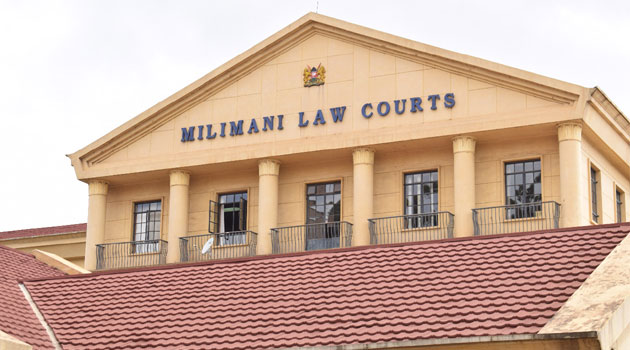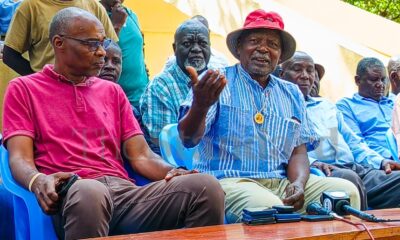News
Court Freezes Assets Worth Sh21.6 Million Linked to Former Water Authority Manager in Corruption Case

The High Court has issued orders restraining James Ambuso Omondi and his wife Janerose Sande Omondi from disposing of 19 properties valued at Sh21.6 million pending determination of a case seeking forfeiture of unexplained wealth totaling Sh112.3 million.
Justice B.M. Musyoki granted the interim injunction sought by the Ethics and Anti-Corruption Commission (EACC) against the couple and their business entities – Ngima Medicare and Laboratory Supplies, and Askaville Meadows – following allegations that the properties were acquired through corrupt means.
The court heard that Omondi worked as Finance and Administration Manager at the Water Resources Management Authority between July 2011 and December 2016, during which period he allegedly engaged in corrupt practices that enabled him to acquire wealth disproportionate to his legitimate income.
According to court documents, EACC investigations revealed that after accounting for the couple’s known legitimate sources of income, there remained an unexplained sum of Sh112,267,914.45.
The properties in question were acquired between January 2012 and April 2014, coinciding with Omondi’s tenure at the water authority.
The frozen assets include properties spread across Kisumu, Kajiado and Kwale counties.
In Kisumu, the properties are located in Buoye, Korando, Kochieng and Sidho East areas, while those in Kajiado are situated in Kaputei North, Kitengela and Loodariak. One property is located in Kwale’s Mahuruni area.
Omondi was previously convicted on four counts of corruption-related offenses by the Chief Magistrate’s Anti-Corruption Court in 2019 and fined Sh7.4 million, which he paid. His subsequent appeal to the High Court was dismissed, and he has filed a further appeal at the Court of Appeal, which remains pending.
The respondents had attempted to have the case struck out, arguing it was sub judice to a constitutional petition they had filed challenging EACC’s investigation methods. However, Justice Musyoki dismissed their application, noting that the constitutional petition had been dismissed in July 2024, with the court ordering EACC to complete its investigations within six months.
“The boundary between the constitutional petition and the civil suit is not blurred. The two suits stand on different thresholds,” the judge observed, citing a Court of Appeal precedent in a similar case involving former Nairobi Governor Evans Kidero.
The court found that EACC had established a prima facie case with probability of success, noting that the defendants had failed to file any response explaining how they acquired the substantial wealth. Justice Musyoki emphasized that in such cases, the burden shifts to the defendants to explain their wealth, failing which it becomes liable for forfeiture.
“When faced with such allegations, it is upon the defendants to explain their wealth, failure to which the same becomes liable for forfeiture to the government,” the judge ruled.
The injunction allows the couple to continue using and occupying the properties but prohibits any transfer, disposal or dealing that would affect the properties’ status, condition or title. The court noted that without the restraining orders, there was likelihood the respondents would dispose of the properties, making it difficult for the government to recover them if the case succeeds.
“In cases of this nature, if given a chance, culprits tend to make the subject matter go out of the reach of the public or the relevant authorities,” Justice Musyoki observed.
The case highlights EACC’s continued efforts to recover assets suspected to be proceeds of corruption, particularly targeting public officials who have acquired wealth beyond their known legitimate income sources.
The matter will proceed to full hearing where EACC will seek to prove that the properties were acquired through corrupt means and should be forfeited to the state. The defendants will have an opportunity to explain the legitimate sources of their wealth and challenge the forfeiture application.
This case adds to a growing list of asset recovery suits filed by EACC against public officials suspected of economic crimes, as the commission intensifies its mandate to recover public resources lost through corruption.
Kenya Insights allows guest blogging, if you want to be published on Kenya’s most authoritative and accurate blog, have an expose, news TIPS, story angles, human interest stories, drop us an email on [email protected] or via Telegram
-

 Business2 weeks ago
Business2 weeks agobetPawa Empire Crumbles: Mr Eazi’s Betting Gambit Unravels Amid Partner’s Shadowy Deals
-

 Business1 week ago
Business1 week agoMinnesota Fraud, Rice Saga, Medical Equipment Deal: Why BBS Mall Owner Abdiweli Hassan is Becoming The Face of Controversial Somali Businessman in Nairobi
-

 News1 week ago
News1 week agoDCI Probes Meridian Equator Hospital After Botched Procedure That Killed a Lawyer
-

 Politics1 week ago
Politics1 week agoYour Excellency! How Ida’s New Job Title From Ruto’s Envoy Job Is Likely to Impact Luo Politics Post Raila
-

 Investigations2 weeks ago
Investigations2 weeks agoEXPOSED: SHA Officials Approve Higher Payments for Family, Friends as Poor Patients Pay Out of Pocket
-

 News1 week ago
News1 week agoKenya Stares At Health Catastrophe As US Abandons WHO, Threatens Billions In Disease Fighting Programmes
-

 Business1 day ago
Business1 day agoCooking Fuel Firm Koko Collapses After Govt Blocks Sh23bn Carbon Deal
-

 Politics2 weeks ago
Politics2 weeks agoJaramogi Clan Tells Raila Jr, Winnie Against Disrespecting Their Uncle Oburu, Warns of Curses


















